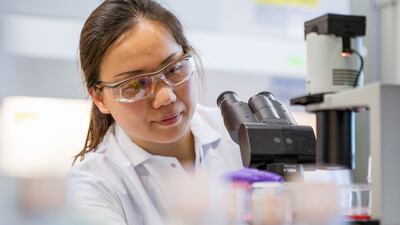Lab Links
Anne Carpenter, one of In Vivo’s 2021 Rising Leaders, talks about the growth of open source technology, putting data into action and why pharma deserves to be rewarded for evolving academic findings into marketable products for patients.
Funded by the UK government, The Rosalind Franklin Institute works with industrial and academic partners from across the UK to foster interdisciplinary research with “real impact.” Leaders from the growing institute talk to In Vivo about validating its success and what it means to seek truly ground-breaking innovation in 2021.
Sublicensing rights, revenue considerations, licensed know-how and diligence milestones: getting these elements right in deals with academic institutions sets the tone for biotechs as they grow and seek partnering opportunities with big pharma.
In this latest edition of the Lab Links series on notable figures responsible for major advances in drug discovery, In Vivo talks to Harvard Medical School professor and biologist Timothy Springer on his 50-year record as an academic scientist, business entrepreneur and philanthropist. His latest venture is being co-founder – and principal funder – of the independent non-profit Institute for Protein Innovation, an institution designed to fill a critical niche in open-source biomedical research.
Japanese firm joins increasing global interest in PROTAC approach to cancer as it links with UK university for drug discovery collaboration.
Ten years after our first encounter with MIT’s Robert Langer, In Vivo sits down with the polymath professor – arguably the most inventive and prolific life scientist of his generation – to identify key challenges in medicine.
INFOGRAPHIC: In Vivo has listed some of the biggest scientific and development challenges still facing the innovative health care sector in 2019.
The attention accorded to dementia, MCI and degenerative brain conditions has been slow to reach the levels given to the more visibly-quantifiable conditions, such as cardiovascular disease and oncology. But earlier detection of cognitive impairment is a priority, despite therapies not yet being available to halt or reverse the conditions. Playing its part to push back the boundaries is Cognetivity Neurosciences, a London-based company with an innovative tool that uses AI to test subjects for the early signs of dementia.
Influenza is a wily foe. It shows up each winter having taken a slightly different guise to outwit our existing immune defenses, but always keeps up its sleeve an ability to shapeshift to an entirely new form that could crash straight through them.
IXICO has been developing medical image analysis and digital health data analytics to help pharma companies better understand how to develop so-far largely elusive therapies for neurological diseases. It is a game of skill, patience and long-term application, but also an environment with short-term opportunities, as IXICO’s Alison Howie explains.
Recent clinical data using antisense drugs in neurological diseases are encouraging signs that targeting genetic drivers of ALS with antisense oligonucleotides or other gene-altering drugs could halt progression of several forms of the disease.









